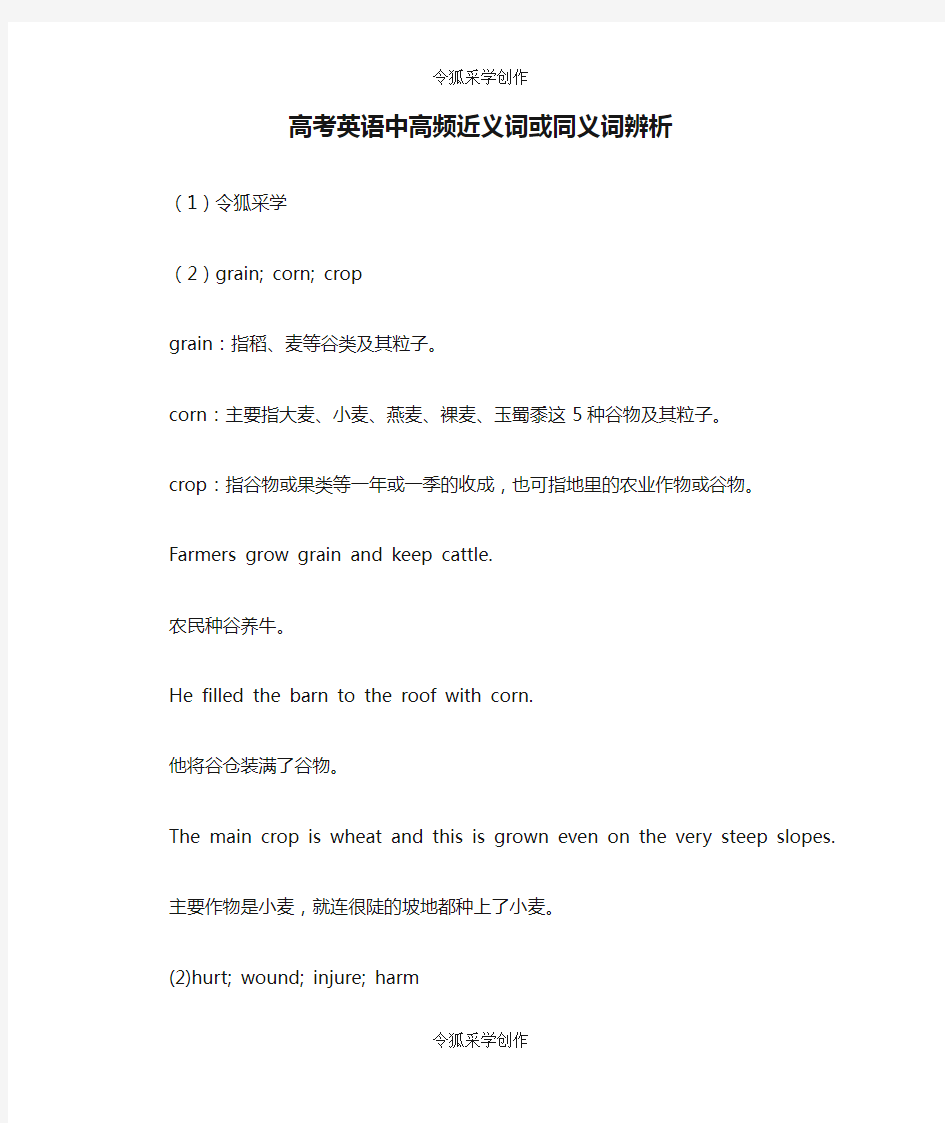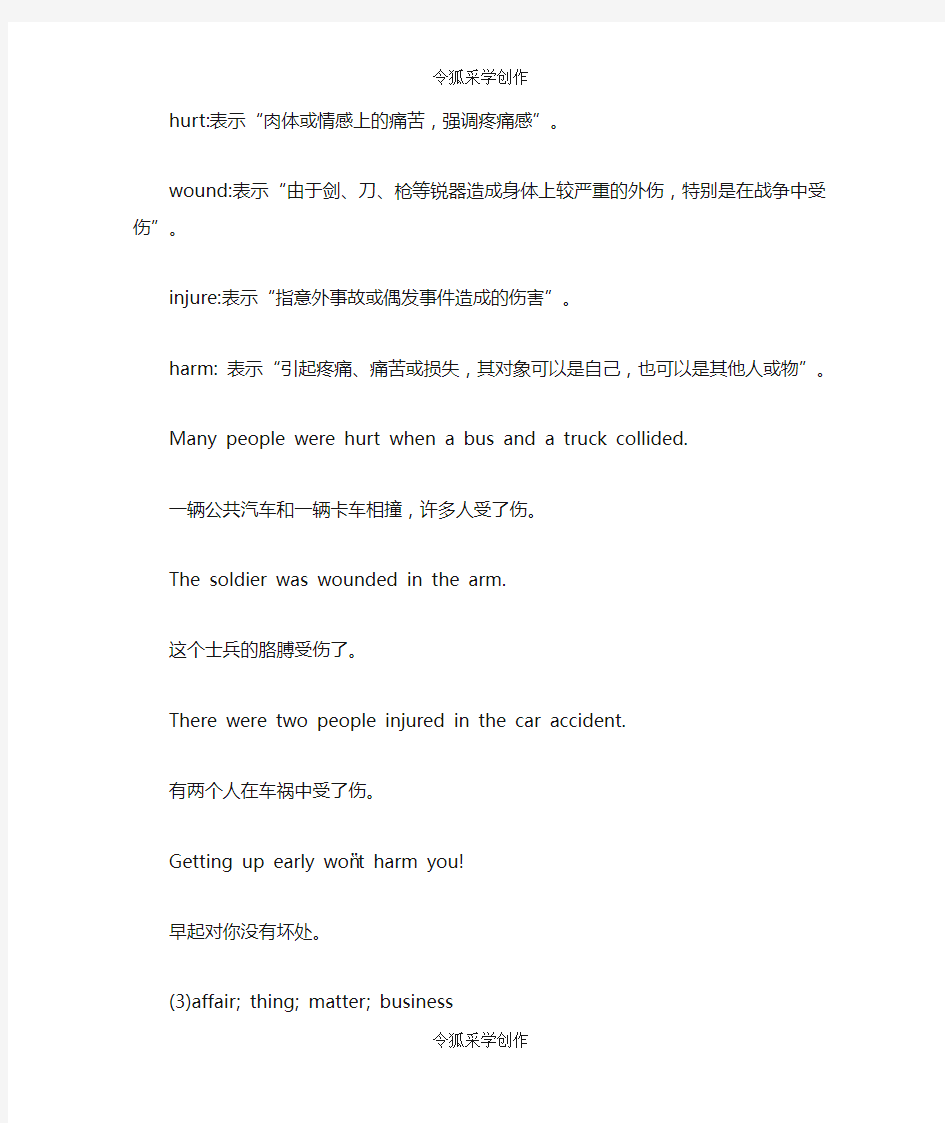高考英语中高频近义词或同义词辨析


高考英语中高频近义词或同义词辨析
(1)
令狐采学
(2)grain; corn; crop
grain:指稻、麦等谷类及其粒子。
corn:主要指大麦、小麦、燕麦、裸麦、玉蜀黍这5种谷物及其粒子。
crop:指谷物或果类等一年或一季的收成,也可指地里的农业作物或谷物。
Farmers grow grain and keep cattle.
农民种谷养牛。
He filled the barn to the roof with corn.
他将谷仓装满了谷物。
The main crop is wheat and this is grown even on the very steep slopes.
主要作物是小麦,就连很陡的坡地都种上了小麦。
(2)hurt; wound; injure; harm
hurt:表示“肉体或情感上的痛苦,强调疼痛感”。
wound:表示“由于剑、刀、枪等锐器造成身体上较严重的外伤,特别是在战争中受伤”。
injure:表示“指意外事故或偶发事件造成的伤害”。
harm: 表示“引起疼痛、痛苦或损失,其对象可以是自己,也可以是其他人或物”。
Many people were hurt when a bus and a truck collided.
一辆公共汽车和一辆卡车相撞,许多人受了伤。
The soldier was wounded in the arm.
这个士兵的胳膊受伤了。
There were two people injured in the car accident.
有两个人在车祸中受了伤。
Getting up early won?t harm you!
早起对你没有坏处。
(3)affair; thing; matter; business
affair:意为“事情、事件”,含义较广,泛指已做或待做的事。复数affairs一般指商业事务及政府的日常事务,如财政管理、外交事务等。
thing:意为“事情、事物”,不管大事小事、好事坏事均称为
thing,一般不能专指事务。复数things还可作“形势”解。matter:重指须留心的要事或问题、难题。
business:作“事务、事情”解时,一般不能用复数,常常指所指派的任务、责任;有时说的是指派的工作或商业上的买卖活动。
(4)a great deal; a great deal of
a great deal:用作名词,意为“大量”,“许多”,作主语、宾语;用作副词,意为“很”或“非常”,作状语,修饰动词或用来强调比较级。
A great deal has been studied and this is the best way.
经过大量研究后,这(被认为)是最好的办法。
a great deal of:意为“大量的”,“非常多的”,相当于much,作定语,后接不可数名词。
A great deal of time/money/energy has been spent on the project.大量的时间/金钱/能源花在那个工程上了。
(5)at the time; at that time; at one time; at a time
at the time:通常用于过去时句子中,指某件事情发生的“当时”、“那时”
Many people saw the strange thing happen at the time.
当时,许多人都看到了这件奇怪的事情的发生。
at that time:则通常指前文明确提到的某个时期、时候。通常其后不带“of...”短语。
In the 17th century much corn was grown in Tibet and Sichuan.
At that time (=At the 17th century) the land along the Changjiang River was becoming very crowded.
at one time:means during a period of time in the past意为“过去有一段时期”,“曾经”。
They used to be good friends at one time.他们曾经是好朋友。
at a time:意为“一次”,表示一个时间单位。它常与表示数量的词语连用,表示频率。
Don’t speak all at once.One at a time, please.
不要同时一起说。一次只一个人说。
(6)repair; mend;fix
repair: 对象范围很广。常指大件或构造较复杂的事物,如钟表、收音机、汽车和机床等大型物体。或用于修筑堤坝、道路和建筑等。
I have to have my watch repaired.
我的表该修理了。
repair a road/ bridge
修理公路/桥梁
mend:一般用于“修补”破损的东西,如衣服、鞋袜、伞和桌椅等整体物体上的裂缝、破洞。
Will you please mend the sleeve of my T-shirt?
请你把我T恤的袖子补一下好吗?
fix:一般用于“修理”构造较复杂的事物,如钟表、收音机、机器等。侧重于“安装”、“调整”。常用于美国口语中。The workers are fixing the machine.
工人们在安装机器。
(7)abandon;desert;forsake;quit
abandon:指完全、永远地放弃,尤指对之负有责任或义务者放弃一个项目或计划。
desert :强调故意违背自己的义务、责任或誓言(擅离职守) 。forsake :指遗弃以前所爱的人或事物着重于断绝情感上的依恋
forsake one's wife and children
遗弃妻儿
forsake bad habits
摈弃坏习惯
quit :指突然或出其不意地放弃。现一般指停止。
quit work
停止工作
(8)accuse;charge
accuse:指控。固定搭配accuse sb of sth/doing sth
charge:指控。固定搭配charge sb with sth/doing sth
(9)win; defeat; beat; gain
win:作“赢”讲时,其宾语常是:war, battle, game, match, argument, a victory, the prize,100 yuan, a race, honor for, the praise, the first place等,而不能是表示人的名词。
beat:及物动词,后面的宾语是“对手”,表示结果。
beat sb in 在比赛、战斗、争论中击败某人。
beat him at table tennis在乒乓球赛中击败他
defeat:指在战斗、战争、比赛中击败对手。强调暂时行为。defeat the enemy in the war在战争中击败敌人
gain:及物动词,表示“获得、赢得所需之物/利益或好处”。gain experience/wealth/the marks/the rank/the prize/knowledge/one’s living/happiness
(10) cost; spend; take; pay
从意义上讲,都可表示“花钱”。如:“我花10元钱买衬衣”。这一句话可有四种翻译:
The shirt cost me ten yuan.
I spent ten yuan on the shirt.
It took me ten yuan to buy the shirt.
I paid ten yuan for the shirt.
结构搭配上的不同
①spend的主语只能是人。
常用结构:sb. +spend(s)+time/money on sth./in doing sth.
②cost的主语只能是指事或物的名词、代词或名词性短语。
常用结构:sth. +cost(s)+ sb. +time/money
③take的主语多为指物的名词。
常用结构:It + takes +time/ money +to do sth.
④pay的主语是人,为买某物而付钱。
常用结构:sb. +pay(s)+ money +for sth
(11)except; except for;except that
except:表示“除去,不包括”,强调所排除的“不包括在内”,一般表示同类之间的关系,常同nothing,all,none,nobody,any等不定代词以及every连用.except 经常接名词或代词,但也可接副词,介词短语。The office is open every day except Sundays.
除了星期日这家公司每天都营业.You can have any of the cakes except this one.
除了这块蛋糕,你哪块都能吃.She saw nothing except snow.
除了雪她什么也没看见.(nothing except = nothing but = only)except for:也表示“除…以外”,指对某种基本情况进行具体的细节方面的修正.它同except的区别是:except for后接的词同句子中的整体词(主语)不是同类的,指从整体中除去一个细节,一个方面;而except后接的词同整体词(主语)一般是同类,指在同类的整体中除去一个部分。
Your writing is good except for a few grammar mistakes.
除了几处语法错误外,你的作文写得很好.
except that:后加从句表示“只是”。On the whole he is a nice person to work with except that he is careless.总的来说,他是一个很好共事的人,只是有些粗心.
(12)ability; capacity;capability
ability:普通用词,指人先天的或学来的各种能力。
capacity:侧重指人的潜在能力,通常不指体力,多指才智,尤指接受与领悟能力。
capability:多用于人,指胜任某项具体工作的能力,也指本身具有、尚未发挥的潜在能力。常与of或for连用。
(13)abolish;cancel; repeal
这些动词均含取消、废除之意
abolish:正式用词,指彻底废除某种制度、规章或习俗。cancel:用法广泛,多指取消债务、合同、证书、比赛、旅行、计划或约会等。
repeal:书面用词,指撤销立法机关通过的协议、法案或法律等。
(14)acknowledge, admit, confess, recognize, concede
这些动词均含“承认”之意。
acknowledge:通常指公开承认某事的真实情况或自己的过错。admit:强调因外力或良心驱使或经判断而明确承认,多含不情愿或被迫意味。
confess:语气较强,着重承认自己意识到的错误或罪行,含坦白忏悔的意味。
recognize:作“承认”解时,系书面用词,主要指合法的或外交上的承认,也指公认。
concede:指在事实与证据面前勉强或不得不承认。
(15)acquire;obtain;gain;get
这些动词均含“获得、取得、得到”之意。
acquire:强调通过不断的、持续的努力而获得某物,也指日积月累地渐渐地获得。书面语用词。
obtain:较正式用词,着重通过巨大努力、要求而得到所需或盼望已久的东西。
gain:侧重指经过努力或有意识行动而取得某种成就或获得某种利益或好处。
get:普通用词,使用广泛,可指以任何方式得到某物,也不一定要经过努力。
(16)above all;after all;at all
above all:意为“尤其是”、“首先”、“最重要的是”,常位于句首或句中,作插入语,起
强调作用。
But above all tell me quickly what I have to do.
可首先快些告诉我该做什么。
after all:意为“毕竟”、“终究”、“终归”、“到底”,在句中位置较灵活。可位于句首、句中或句末。
After all,your birthday is only two weeks away.
毕竟,两周后就是你的生日。
He is,after all,a small child.
他毕竟还是个小孩子。
He failed after all.
他终于失败了。
at all:用于否定句时,意为“丝毫;根本”,用于疑问句时意为“究竟;到底”,用于条
件句时,常译为“当真;实在”。用于肯定句中,表示说话人的某种情绪或情感(如怀疑或
惊奇等),意为“竟然”等。
He does n’t like you at all.
他根本不喜欢你。
Are you going to do it at all?
你究竟做不做这件事?
If you do it at all,do it well.
若你真要做这件事,就得做好。
I was surprised at his coming at all.
他竟然来了,我很惊讶。
(17)abundant; plentiful; ample
这些形容词均有“充分的、丰富的”之意。
abundant :着重某物极为丰富有或大量的供应。
However abundant certain natural resources may be, they cannot repr oduce themselves and are bound to be used up ultimately.
不管某些自然资源多么丰富,它们不会再生,终究要被使用完的。plentiful :普通用词,指某物的数量多得称心如意,不过剩,但较少用于描写抽象之物。
Provisions are plentiful.
粮食充足。
Herrings were once very plentiful.
鲱鱼曾经非常丰富。
ample:指某物不仅满足了需要而且有余。
We have ample money for the journey.
我们有足够的钱去旅游。
Ample food and clothing by working with our own hands. 自己动手,丰衣足食。
(18)absurd;ridiculous
这两个形容词均含有“荒谬的”之意。
absurd: 普通用词,强调指违背常理的荒谬。ridiculous:强调荒谬到令人发笑的地步。
It’s absurd to be afraid of them.
害怕他们是荒谬的。
To maintain that we can survive a nuclear war is absurd. 认为我们能在核战争中幸存下来的说法是荒唐的。
This is perfectly ridiculous.
这非常荒谬可笑。
Whoever told you such a ridiculous story? 这荒谬的故事是谁给你讲的?
